AGE OF THE ASSASSIN
Assassination nation – political contract killings escalate in KZN as hitmen are offered ‘job after job’
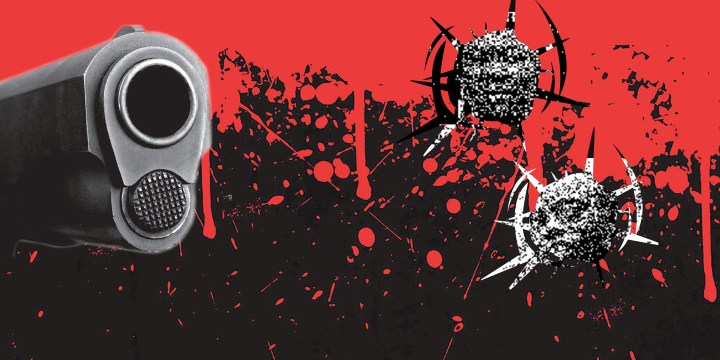
Contract killings are escalating in South Africa, especially in the volatile province of KwaZulu-Natal, where trained assassins have been making their presence felt in the taxi industry, across the political spectrum, over tenders and jobs in municipalities, and in other areas such as business, to settle disputes through the barrel of a gun.
On Saturday, 4 November, hundreds of mourners gathered to pay their last respects at the sombre and emotional funeral of Inkosi Siphamandla Khumalo (41), a popular chief of the Qomintaba clan in northern KwaZulu-Natal, and his wife Thuthukile. Khumalo had played leadership roles in various local traditional structures and the murders are believed to be linked to the positions of power he had held.
The couple died on 28 October when they were ambushed by unknown assassins while driving near Utrecht. Their four-year-old son survived. The killers are still at large.
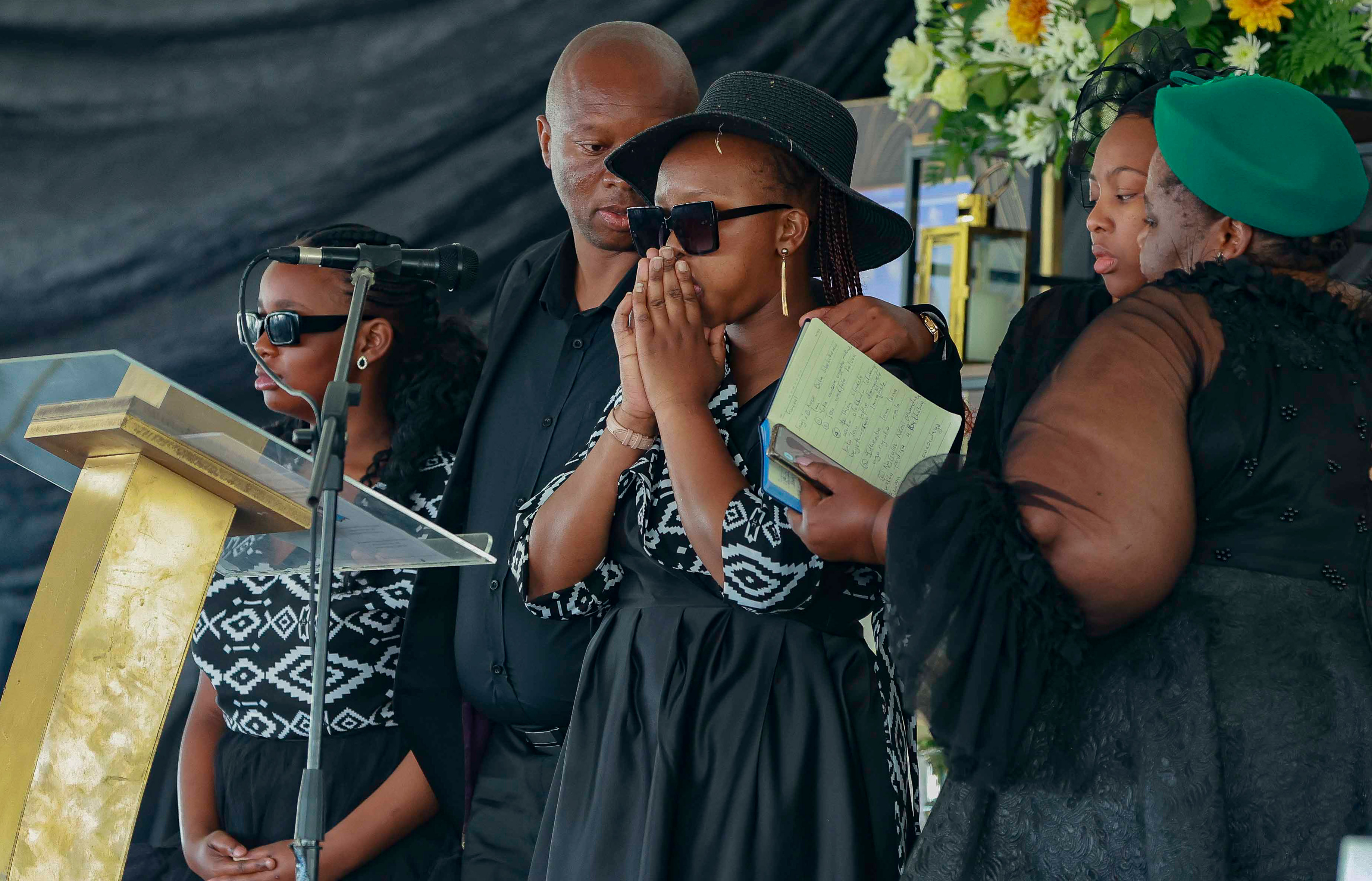
The sombre and emotional funeral of Inkosi Siphamandla Khumalo (41), a popular chief of the Qomintaba clan in northern KwaZulu-Natal, and his wife Thuthukile. (Photo: Supplied)
These murders came less than two weeks after Police Minister Bheki Cele extolled the good work the police were doing in arresting those responsible for the numerous political killings in KwaZulu-Natal.
But the deaths continue. On Friday, 3 November, an acting senior manager in the eThekwini metro’s water and logistics department was gunned down by unknown gunmen who ambushed him at his home in Mandeni on the north coast.
Contract killings are escalating in South Africa, especially in the volatile province of KwaZulu-Natal, where trained assassins have been making their presence felt in the taxi industry, across the political spectrum, over tenders and jobs in municipalities, and in other areas such as business, to settle disputes through the barrel of a gun.
In politics, these organised hits have become commonplace. In August, Mabhungu Mkhize (45), an ANC councillor in the Msunduzi Local Municipality (Pietermaritzburg) was shot and killed in Imbali. Three men were arrested hours after the murder and later appeared in the Pietermaritzburg Magistrates’ Court, where they withdrew their bail application.
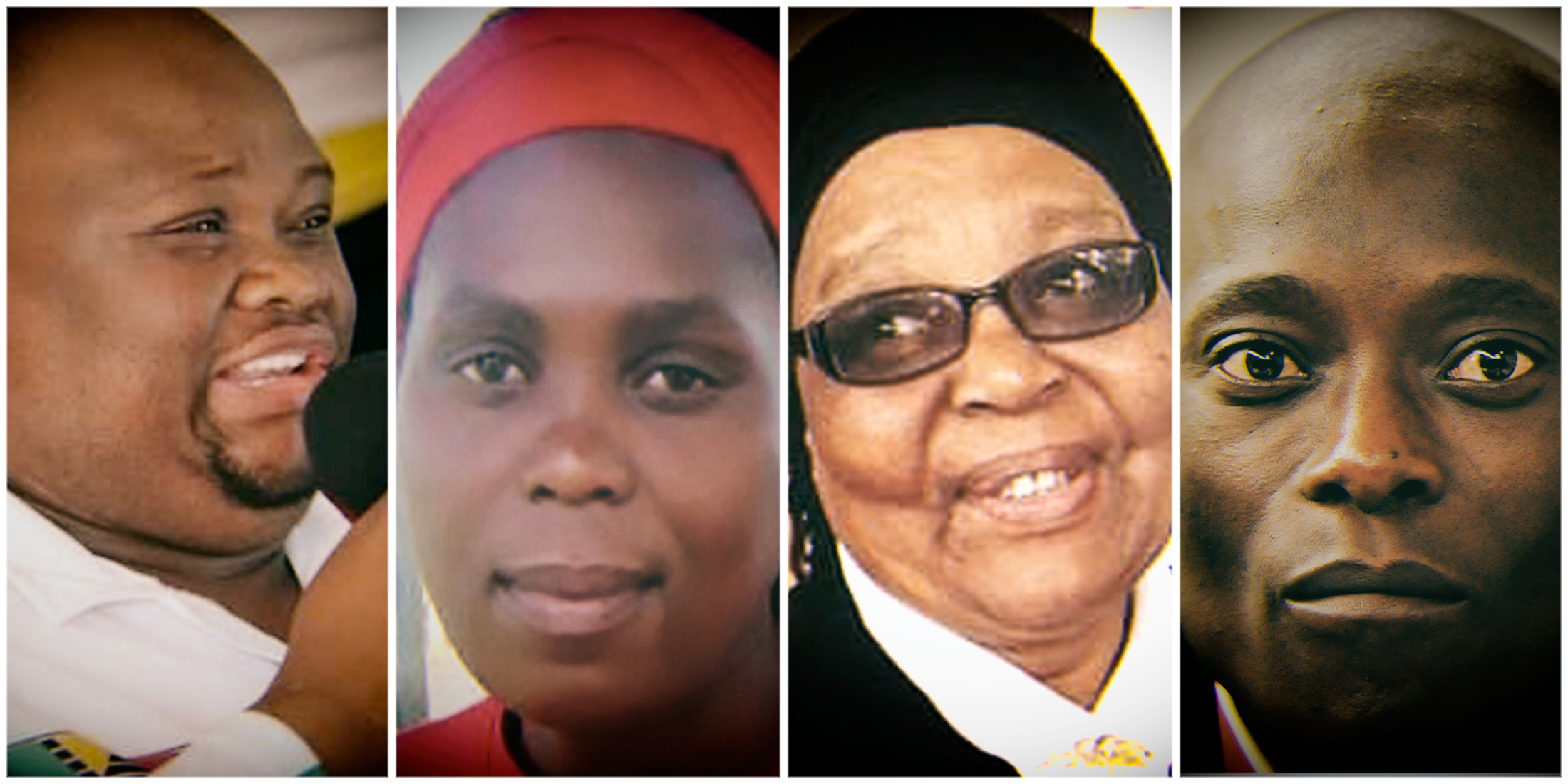
From left: IFP councillor Innocent ‘Killer’ Mkhwanazi was shot and killed by unknown gunmen. (Photo: Supplied); Abahlali baseMjondolo activist Nokuthula Mabaso was shot dead in front of her children at her home in the eKhenana settlement in Durban. (Photo: GroundUp); National Freedom Party councillor Ntombenhle Mchunu was sleeping in her home in Nongoma when gunmen broke in during the night and shot her. She died on the scene. (Photo: Supplied); ANC councillor Sindiso Magaqa was shot at a carwash in his hometown of Ibisi, near Umzimkhulu, KwaZulu-Natal. He died three months later. (Photo: Leratu Maduna / Gallo Images)
In July, a well-known IFP leader and councillor in the uMkhanyakude District Municipality, Innocent “Killer” Mkhwanazi (43), was shot and killed by unknown gunmen, who are still at large. His killing is believed to have been politically motivated.
Also in July, National Freedom Party councillor Ntombenhle Mchunu (75) was sleeping in her home in Nongoma when gunmen broke in during the night and shot her. She died on the scene. A granddaughter who was with her survived with serious injuries.
Mchunu was serving in the volatile Nongoma Local Municipality, where power is constantly changing hands from an IFP-led coalition to an ANC-led coalition. Council meetings are now held virtually as councillors live in fear of being assassinated.
Some of the other high-profile killings in the province include the 2017 murder of former ANC Youth League secretary-general Sindiso Magaqa, a councillor in the Umzimkhulu Local Municipality who had questioned irregular expenditure.
Magaqa was ambushed by armed men at a carwash in his hometown of Ibisi. Two other councillors who were with him in the vehicle were also shot and injured in the attack. Four men were arrested and are standing trial for his murder.
A murder that had a strange twist happened just days before the November 2021 local government elections. Siyabonga Mkhize, then an ANC councillor for eThekwini’s ward 101, was campaigning with two bodyguards in Cato Crest when they came under attack. Mkhize and one bodyguard died on the scene, and the second one was rushed to hospital.
Mkhize’s name was on the ballot for the elections and he won the seat posthumously, thus instantly triggering a by-election. The man who replaced him as the candidate, Mzimuni Ngiba, won the seat comfortably.
A few months after the by-election, Ngiba was arrested and charged with Mkhize’s murder. He received his full councillor salary for more than a year while awaiting trial.
The ANC-led council only recently approved the process of removing Ngiba from both the payroll and as a councillor.
Abahlali baseMjondolo, the shack dwellers’ movement that primarily campaigns for land, housing and dignity for the poor, said it had lost 25 activists since 2009. Four of its activists were shot and killed last year alone.
Abahlali baseMjondolo leader S’bu Zikode said few of the killers had been arrested and prosecuted, and he and some of his fellow leaders had been forced to get bodyguards after receiving threats from assassins. As a result, Abahlali’s activities and programmes had been disrupted, primarily by people linked to the ANC, he claimed.
Zikode said his organisation was forced to report South African authorities internationally, and the United Nations discussed the matter in November last year.
In March last year, Abahlali baseMjondolo activist Nokuthula Mabaso was shot dead in front of her four children in the eKhenana settlement in Cato Manor, just two months after the killing of Ayanda Ngila, a fellow Abahlali activist. eKhenana is in Ward 101, which is arguably the most politically volatile in the eThekwini metro.
Mabaso had been at the scene when Ngila was killed, and Abahlali leaders believe the motive was to eliminate a key witness. Her killers are still at large.
Sbu Mhlongo, Mabaso’s husband, said the family could barely hold it together. “We are all affected by it. It was too emotional for the kids. They couldn’t continue living here in eKhenana after witnessing their mother’s shooting. We had to arrange for them to live with relatives.
“The disabled child was struggling to get a boarding school that would look after him, but he got one recently and he is living there now. I sometimes wonder why they could target the mother of my children,” Mhlongo said.
KwaZulu-Natal’s political assassinations led to the Moerane Commission of Inquiry, which heard evidence of murders, extortion and hits on individuals holding key positions. Giving evidence at the commission, then premier Willies Mchunu said his party had called for the commission “out of concern” that political killings were getting out of hand.
After listening to more than 60 witnesses and family members of the victims, the commission released its 434-page report, which recommended, among other things, that political parties must “take responsibility for the violent competition between their members for political positions and power”.
The commission also stated that political parties should carry out political education about the “universal practice of peaceful political competition”; discipline their members and report those who are involved in killings to the police; and settle differences “through peaceful means”.
Government critics say few, if any, of these recommendations have been implemented, hence the hits continue unabated.
Vanessa Burger, an independent peace activist, said: “If the commission [was] unwilling to make recommendations regarding prosecutions, there can be no accountability and justice will not be done.”
She added that political and other killings were so rife in KwaZulu-Natal because of the lack of arrests and prosecutions.
“How broken is a democracy in which law enforcement defers not only to political leaders, but to lowly, politically connected public servants? How broken is an economy in which an increasing number of young men resort to killing to make a living?”
Burger said the killings and violence would only come to an end when the police were able to confiscate thousands of often illegal firearms, arrest the killers and stop the hitmen networks that had developed and were now prospering in KwaZulu-Natal and other provinces.
In April 2023, the Global Initiative Against Transnational Organized Crime released a report titled Murder by Contract: Targeted Killings in Eastern and Southern Africa. The initiative had recorded 141 assassinations in South Africa the year before, defining them as targeted hits with victims being killed for political, commercial or personal gain by a third party or parties contracting a hitman or hitmen.
“The taxi industry is notoriously violent, partly owing to the lack of regulation. Taxi-related violence can range from shoot-outs at taxi ranks to more professional and targeted hits on presumably important figures within the industry,” the report stated.
“Such incidents are understood to typically stem from competition between taxi associations over routes, or relate to conflict arising from leadership competition within the associations,” it said.
The KwaZulu-Natal chapter of the South African Local Government Association (Salga) said more than 20 councillors had been killed in the province in the past 10 months.
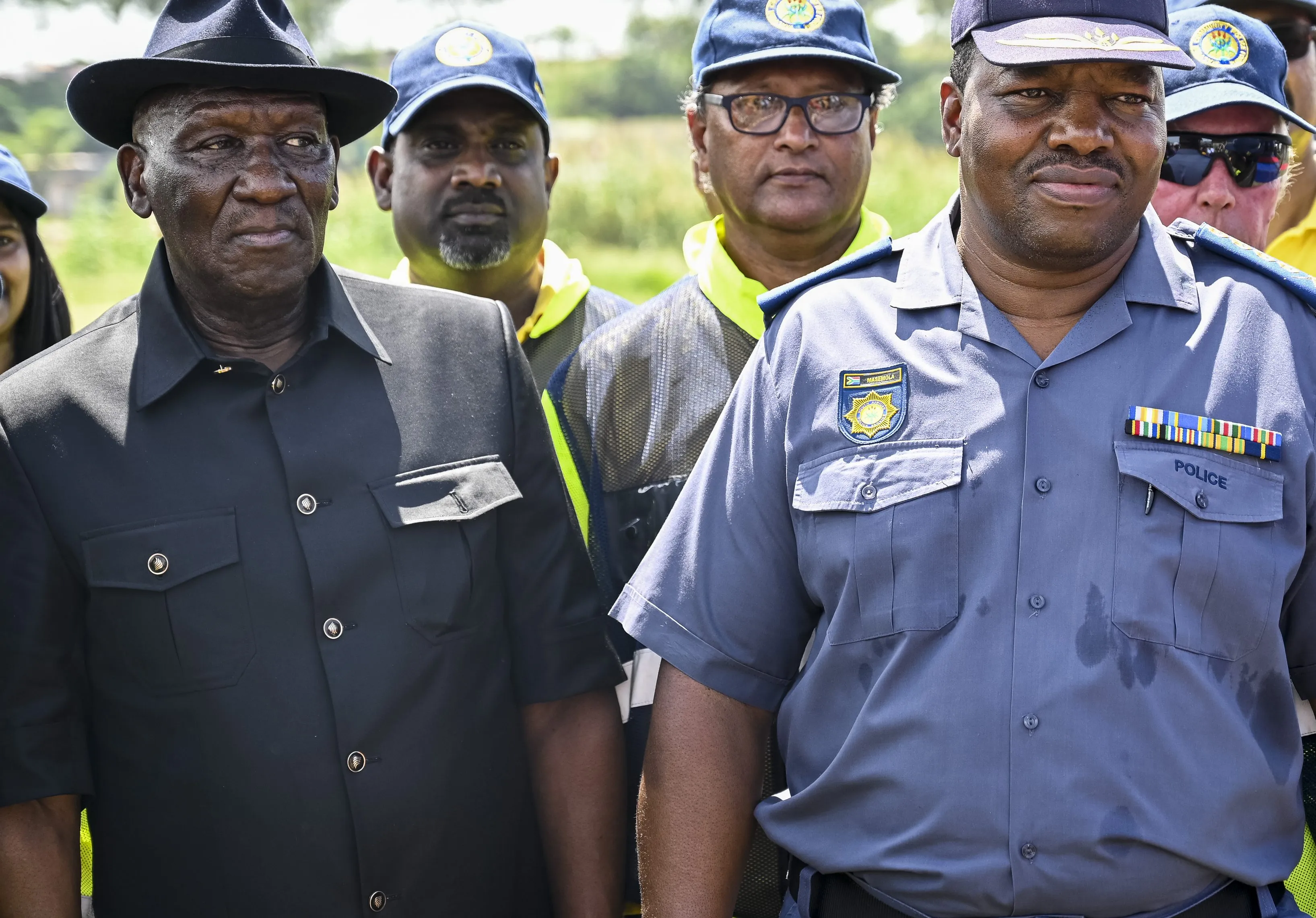
General Bheki Cele, Minister of Police, and General Fannie Masemola, National Commissioner of the SA Police Service on 18 March 2023 in Durban, South Africa. (Photo: Gallo Images / Darren Stewart)
Thami Ntuli, an IFP leader and chairperson of Salga in the province, said: “We are calling on President Cyril Ramaphosa and Minister Bheki Cele to start taking the political killings in KwaZulu-Natal seriously.
“This wanton killing of our councillors and leaders has been going on for many years now, but it seems like the government is doing nothing because the perpetrators of these heinous crimes are not arrested and brought to book.
“We want to see arrests and convictions. We will not be able to build a safer society if we cannot secure our councillors, secure our community leaders,” Ntuli said.
Questions sent to Cele by Daily Maverick were not answered.
But early in September, KwaZulu-Natal police commissioner Lieutenant General Nhlanhla Mkhwanazi was among the members of an interministerial task team who briefed the media on the latest convictions, investigations and trends in political killings in the province.
Mkhwanazi said a special police task team charged with investigating political assassinations had been strengthened and was making good progress.
He also said some of the firearms used in political and other contract hits were hired from rogue police officers and private security companies, whereas the rest were illegal guns that had made their way into the hands of killers. “We have arrested some of our SAPS members who are suspected of being involved in the murder of councillors and their service firearms were confiscated,” Mkhwanazi said.
The National Prosecuting Authority was part of the briefing. Advocate Elvis Gcweka, a senior prosecutor in the province, told the gathering that the authority was in the process of establishing a special court for political contract killings and had asked for an unused chamber in the KwaZulu-Natal Division of the High Court in Pietermaritzburg to be used for these cases.
Gcweka said the court would start working early in 2024 and similar special courts would be established in other parts of KwaZulu-Natal. DM
‘I get paid up to R500,000 to conduct a hit job’
Hitmen have been present in KwaZulu-Natal for many years, operating freely and doing their deadly business, with only a few arrests here and there. The majority of the killings go unpunished. Also known as izinkabi, members of this group of ruthless killers have a code of secrecy and protection.
Daily Maverick spoke to two izinkabi who are active. They take jobs from the taxi industry, they work across the political landscape and they eliminate the rivals of their paymasters.
Thembinkosi Ndlovu* (37) said he started his journey as a hitman when he was 22. He has carried out more than 25 hits. Only once was he caught, but his paymasters arranged a good lawyer for him and the case was dropped because of a lack of evidence.
“I come from a very poor family in northern KZN. I was unemployed, living in a hostel in Joburg, when I was approached by a man who said he’d get me in. I went on the first job. I didn’t have to do the shooting myself but was keeping watch over the two main killers. I was paid R20,000 for the job.
“From there onwards, I have carried out hits of my own,” he said, adding that he was now paid up to R500,000 for a hit, especially if he had to kill a high-profile political leader or taxi boss.
“There are so many aspects to this job. Other taxi owners will offer you a [Toyota] Quantum and put it on their route if you carry out a hit for them.”
Ndlovu said he got his assignments through an elaborate and impenetrable network designed to prevent police detection and protect both the hitmen and their paymasters.
Sbusiso Ntuli* believes his profession has gone to the dogs. “For me, I think I was destined for this job [of being an inkabi]. My father had kombis [taxis].
“He always kept big and small guns, hidden underground, just in case we came under attack. This was because of the taxi wars and other local deadly wars between one area against another. I was about 10 or 11 when my father showed me these guns. As a teenager, I played and practised with them.
“Even after my father had passed on, the guns stayed with us, and my uncles came from time to time to borrow them and return them.
“In later years, I was invited when there were attacks. I was a marksman and gained a reputation for splitting the skull. After that, I was called whenever there was someone to be eliminated. From there, it’s been job after job. I don’t even know how many people I have killed.
“Today, everyone is called an inkabi, but when you look at them, they are nothing but petty criminals who just shoot to kill.
“The real inkabi lives and works using a strict code of conduct. As a rule, we don’t kill women and children. We keep track of the target until he is alone and we are able to take him out without other people getting involved. Otherwise [if you kill women and children], you weaken the umuthi [traditional medicine] you use to protect you from harm.”
Ntuli knows many of the veteran izinkabi because, he said, “we work together in cash-in-transit heists and we also pass some of the hit jobs to each other, especially if the job is too awkward or involves people you know at a personal or other level, but you want to keep your bosses happy and onside”.
“But now you find some bosses telling you about a job and, when you name the price, they tell you that they can get someone cheaper,” he said.
Both Ndlovu and Ntuli said hitmen were often found at men’s hostels because these provided a perfect place to hide before and after a hit, and hostels were not frequented by the police. DM
*Not their real names
This story first appeared in our weekly Daily Maverick 168 newspaper, which is available countrywide for R29.
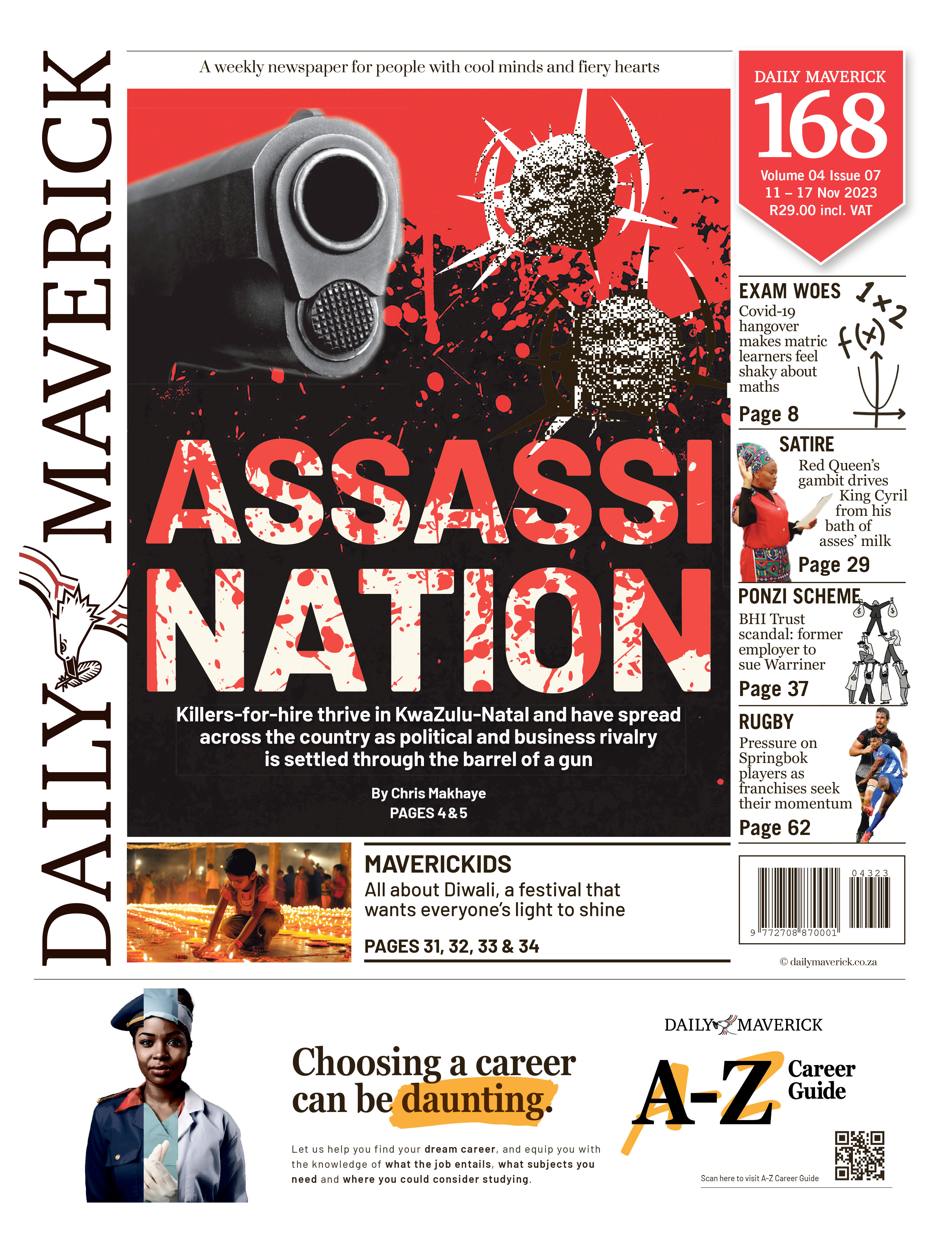

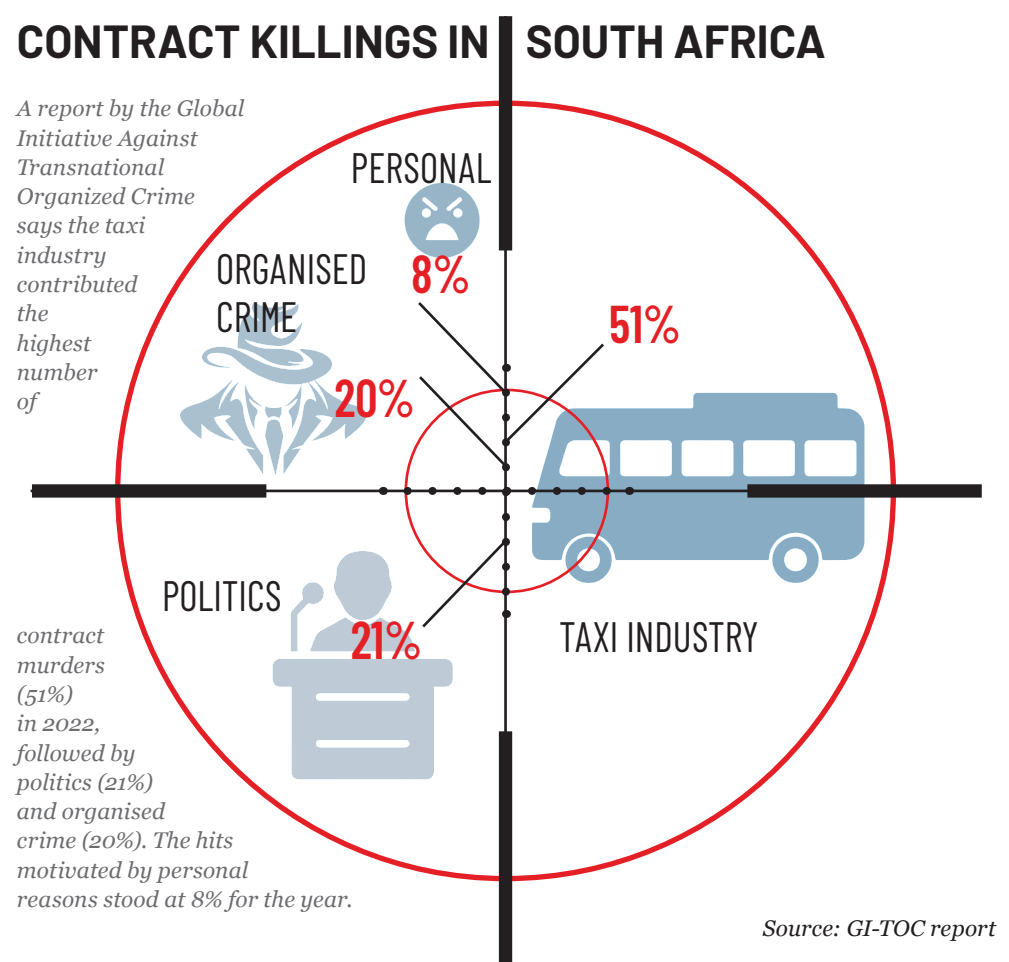
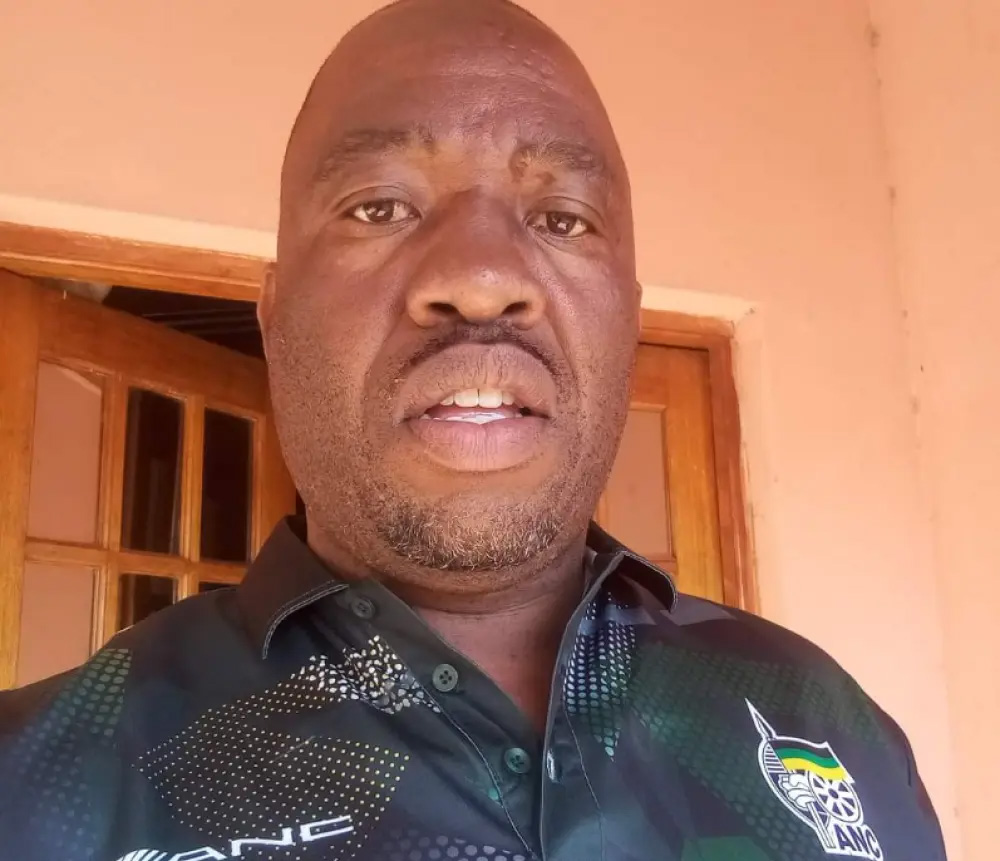
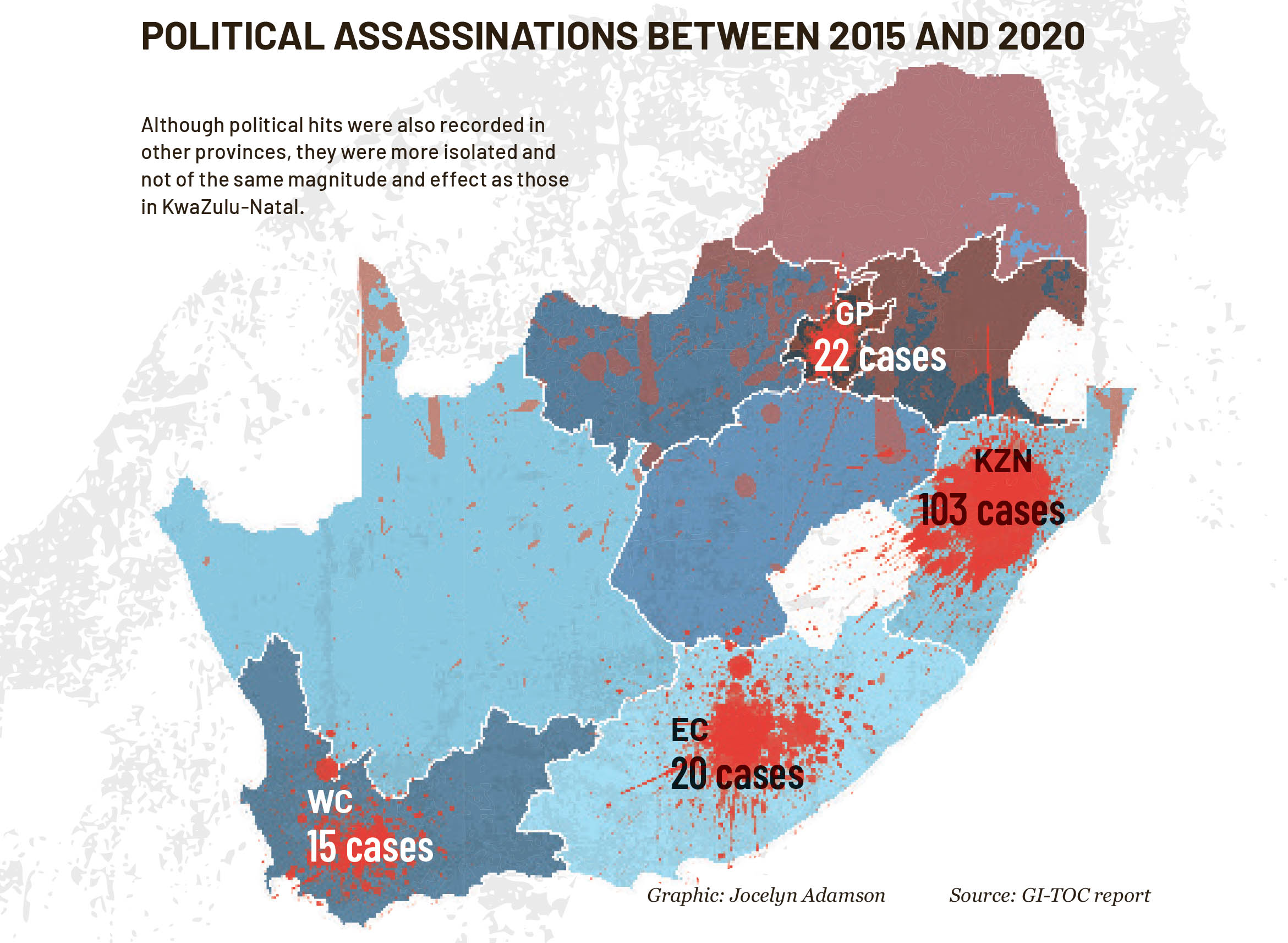



















 Become an Insider
Become an Insider
The gangster state we call home.
The only nice thing about this article is the image showing most of the country colored blue.
No word from Malema and his EFF … no word from BLM?
Black lives don’t matter when it’s blacks who kill blacks?
Black lives only matter in White governed countries such as America, England or France?
Another demonstration of a useless president who keeps a totally incompetent minister of police in his job.
“Useless” and “incompetent”? You give them far too much credit.
To me the underlying message of this article is that politics have become a massive job and wealth creator. Ie the state and its organs have become an employer of choice and read in this, the only employer. These killings are symptomatic of failed economic plans of 30 years. We need to get rid of the ANC at the ballot box and educate people that even though the ANC, and specifically Ramaposer, have assisted in writing the constitution, they never had the intention nor the ability to follow it and implement it.
Leopards don’t change their spots. I’m not at all sure that removing the ANC will stop people killing each other to secure their place at the trough.
go and get rid of ANC alone,i just dnt understand what you mean “WE’.
If you aren’t wanting to replace the ANC with a government that actually governs and looks after all the citizens of this country then I feel sorry for you as you are failing the people you love.
The only successful ANC business, the one that keeps growing. Where have we heard the phrase “making good progress” before? Un-bloody-believable! Literally.
I hear you.its so sad if the hitman says he can’t even remember how many people he has slaughtered
It is sad because his maths or his memory is not very good or maybe he is indifferent, it is after all, just a job, a cruel, heartless, soulless job. What is sadder is that the police have been unable to arrest these people who have murdered dozens of people.
It is probably the result of the police not willing to arrest these people for one of two reasons:
1 They are afraid themselves
2 They are part of the problem ie in cahoots with the hitmen.
I strongly believe that Cele and Ramaposer are thoroughly aware of the problem and in all probability Cele has a list of the names of the hitmen. It is just too lekkah for them to let this sordid status quo go on than to have to act. Please also do not rule out the possibility that some of these hitmen in all probability has ties back to Mabuza, probably to Mantashe and Cele and possibly to Ramaposer himself. If one person squeals that he worked on instruction of Mabuza, then Ramaposer is either incompetent for not knowing or in cahoots for not doing something.
Life has always been cheap in RSA
If anyone needed convincing that SA has degenerated into a Gangster State, simply read this article. When some grubby ANC politician said “it’s our time to feed”, little did the nation expect this level of outrageous action to get to the feeding, slobbering trough. It’s a frenzy led by those politically connected in the dark underworld and doubt there is any chance of ending the carnage.
Bring back the death penalty!
A killing culture for power and money and status for years and years and years. Denise Smit
This is a demonstrable failure of ANC governance and the result of appointing a corrupt minister of police!
Interesting how the cadres are always going on about the evil western world, but will evidently go as far as killing each other to get their hands on wads of cash to purchase the good produced there.
Advancement by assassination is the KZN way and has been since Shaka was killed by Dingaan. Nothing changes.
Political parties in exile pre 1994 regularly killed opponents or anyone they felt was a threat. This mafia style has slowly crept into the taxi industry and now even into organised business and more especially into high levels of government. Rumour has it that Bheki Cele was himself a feared force in the taxi industry back in the day. We’ve really reached crisis proportions when a business forum can tank a multi-billion-rand water project demanding 30% of the value of the project in return for doing nothing.